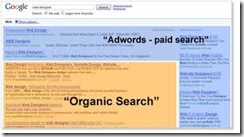Paid search ads tend to be overlooked
Search has become a nearly ubiquitous online activity and Google remains the undisputed king—receiving the largest share of search ad revenue and traffic. But an eye-tracking study by user experience research firm User Centric adds a new perspective. Its research indicates that most search users overlook search ads almost entirely.
The findings showed organic search results were viewed 100% of the time, and participants spent an average of 14.7 and 10.7 seconds looking at organic search results on Google and Bing, respectively. However, only 28% of participants looked at right-side ads on Google, and just 21% did the same on Bing—spending around 1 second viewing all ads combined on each search engine. To put this in perspective, searchers who viewed the left-hand site navigation spent more time doing so than they did viewing ads on both search engines.
One caveat to the study: It was an artificial search environment. The participants were given search terms to use and may not have been using their preferred search engine. However, participants searched on both sites in this study, and the results were statistically significant.
With users spending nearly all their time viewing organic search results, Hitwise’s latest numbers give some further insight. Bing and Yahoo!’s success rates, meaning searches that resulted in a click, are just over 81% whereas Google sits much lower at 65.6% in December 2010 and January 2011.
Although the sheer volume of searches Google handles may bring down its success rate, the difference been Google and Bing is still large enough to draw conclusions. First, users were shown to spend the vast majority of their time looking at organic search results on both search engines, and Bing’s success rate is 16 percentage points higher than Google’s. Therefore, even though Google has more traffic than Bing, the Microsoft search engine generates a greater share of relevant traffic per search.
Additionally, this data indicates that SEO is more essential than ever. Users have learned to overlook search ads, and they will continue to ignore such ads as they become even more search-savvy over time.
SEO will become increasingly challenging as users start to rely on search engines for different reasons. A recent study from Forrester Research found that internet users were 22 percentage points less likely in 2010 to rely on search engines to find websites than they were in 2004. Although this doesn’t mean people are using search engines less to find information about product types or branded goods, it does mean that they are relying on search less to find websites specifically.
Perhaps this change is because internet users are becoming more knowledgeable and do not need to rely on search to find popular sites such as Facebook and YouTube. Also, they may be relying on social media more to find websites. No matter the reason, this data indicates that search users’ behaviour is in constant flux. As search users continue to change their behaviour, marketers will need to adjust their SEO strategy to keep up.



























Leave a Comment